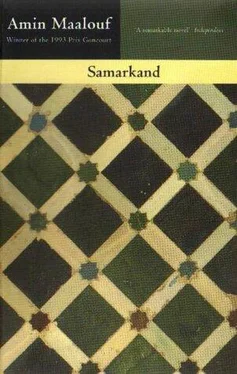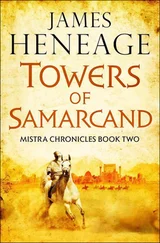He had even gone into the forbidden room once, at the age of seventeen, had walked around it, gone up to the magic basin and dipped his hand into the icy water then stopped in front of the niche which enclosed the manuscript. He almost opened it, but changed his mind, took a step back and then walked backwards out of the room. He did not want to go any further on his first visit.
When the heir wandered, in pensive mood, through the alleyways of Alamut, people gathered around while not getting too close and uttered curious formulae in blessing. He was also called Hassan, like Sabbah, but another name was already being whispered around him: ‘The Redeemer! The Long-Awaited!’ Only one thing was feared: that the old guard of the Assassins, who knew his feelings and who had already heard him rashly censure the prevailing atmosphere of severity, would prevent him from acceding to power. In fact his father did try to impose silence upon him, even accusing him of being an atheist and of betraying the teachings of the Founder. It was even said that he had two hundred and fifty of his partisans put to death and expelled two hundred and fifty others, forcing them to carry the corpses of their executed friends on their backs down to the foot of the mountain. However, due to a trace of paternal feeling, the Grand Master did not dare follow Hassan Sabbah’s tradition of infanticide.
When the father died, in 1162, the rebellious son succeeded him without the slightest hitch. For the first time in a long while real joy broke out in the grey alleyways of Alamut.
But was it really a question of a long-awaited Redeemer, the adherents asked themselves. Was it really this man who was to put an end to put an end to their suffering? He himself said nothing. He continued to walk around distractedly in the alleyways of Alamut or he spent long hours in the library under the protective eye of the copyist who was in charge of it, a man originally from Kirman.
One day he was seen walking decisively toward Hassan Sabbah’s former residence. He threw the door open, walked up to the niche and shook the grate with such violence that it came away from the wall letting a stream of sand and bits of stone pour on to the floor. He lifted out Khayyam’s manuscript, tapped the dust off it, and carried it away with him under his arms.
It was then said that he shut himself up to read, to read and to meditate, until the seventh day, when he gave the order that everyone in Alamut, men, women, and children, should assemble in the maydan , the only place large enough to hold them all.
It was 8 August 1164. The sun of Alamut was beating down on their heads and faces but no one thought of protecting himself. Toward the west there rose a wooden dais, decked out with a huge standard, one red, one green, one yellow and one white, at each of the four corners. It was in this direction that everyone’s gaze was directed.
Suddenly he appeared, dressed all in dazzling white, with his slight young wife behind him, her face unveiled, her eyes cast to the ground and her cheeks flushed with confusion. In the crowd it seemed that this apparition dispelled the last doubts; people were boldly murmuring: ‘It is He. It is the Redeemer!’
Solemnly he climbed the few steps to the platform, and gave his faithful a warm gesture of welcome, intended to silence the murmurings. Then he went on to pronounce one of the most astonishing speeches ever heard on our planet:
‘To all the inhabitants of the world, jinns, men and angels!’ he said. ‘The Mahdi offers you his blessing and pardons all your sins, both past and future.
‘He announces to you that the sacred Law is abolished for the hour of the Resurrection has sounded. God imposed on you his Law to make you earn Paradise and indeed you now deserve it. From today on, Paradise is yours. You are thus free of the yoke of the Law.
‘Everything that was forbidden is permitted, and everything that was obligatory is forbidden!
‘The five daily prayers are forbidden,’ the Redeemer continued. ‘Since we are now in Paradise and in permanent contact with the Creator, we no have any need to address Him at fixed times; those who persist in making the five prayers show thereby how little they believe in the Resurrection. Prayer has become an act of unbelief.’
On the other hand, wine, considered by the Quran to be the drink of Paradise, was from now authorized; not to drink it was considered to be a manifest sign of a lack of faith.
‘When this was proclaimed,’ a Persian historian of the time related, ‘the assembly started to rejoice on the harp and the flute and to drink wine conspicuously on the very steps of the dais.’
It was an excessive reaction, in proportion to the excesses practised by Hassan Sabbah in the name of Quranic Law. Soon the successors of the redeemer would set themselves to diminishing his messianic ardour, but Alamut would never again be this reservoir of martyrs desired by the Supreme Preacher. Life would henceforth be sweet and the long series of murders which had terrorized the cities of Islam would be interrupted. The Ismailis, as radical a sect as there ever was, would change into a community of exemplary tolerance.
In fact, after having announced the good news to the people of Alamut and its surroundings, the Redeemer sent emissaries off to the other Ismaili communities of Asia and Egypt. They were provided with documents signed by his hand, and asked everyone to celebrate the day of redemption whose date they gave according to three different calenders; that of the Hijra of the Prophet, that of Alexander the Greek and that of the ‘most eminent man of both worlds, Omar Khayyam of Nishapur’.
At Alamut the Redeemer gave orders that the Samarkand Manuscript be venerated as a great book of wisdom. Artists were commissioned to ornament it with pictures, to illuminate it and to make for it a casket of chased gold encrusted with precious stones. No one had the right to copy its contents but it was placed permanently on a low cedar table in the small inner room where the librarian worked. There, under his suspicious surveyance some privileged members would come to consult it.
Until then, people knew only a few of Khayyam’s quatrains, which had been composed in his impetuous youth; now many others were learnt, quoted and repeated — some with serious alterations. This period also saw one of the strangest phenomena: whenever a poet composed a quatrain which might cause trouble for him, he would attribute it to Omar; hundreds of false rubaiyaat came to be intermixed with those of Khayyam, to the extent that, in the absence of the manuscript, it was impossible to discern which were truly his.
Was it at the Redeemer’s request that the librarians of Alamut, from father to son, took up the chronicle of the manuscript at the point where Vartan left it? In any case, it is from this single source that we know Khayyam’s posthumous influence on the metamorphosis the Assassins underwent. The concise yet irreplaceable account of history was carried on in the same way for almost a century until a new brutal interruption — the Mongol invasions.
The first wave, led by Chengiz Khan, was, beyond a shadow of doubt, the most devastating scourge ever to cross the Orient. Important cities were razed and their population exterminated. Such was the case with Peking, Bukhara and Samarkand, whose inhabitants were treated like cattle with the young women handed around the officers of the victorious horde, the artisans reduced to slavery and the rest massacred with the sole exception of a minority who, regrouping around the grand qadi of the time, very quickly proclaimed their allegiance to Chengiz Khan.
In spite of this apocalypse, Samarkand appeared to be almost favoured, since it would one day be reborn from its rubble to become the capital of a world-wide empire — that of Tamerlane — in contrast to so many cities which were never to rise again, namely the three great metropolises of Khorassan where all this world’s intellectual activity had long been concentrated: Merv, Balkh and Nishapur — to which list must be added Rayy, the cradle of oriental medicine whose very name would be forgotten. The world would have to wait several centuries in order to see the rebirth, on a neighbouring site, of the city of Teheran.
Читать дальше












